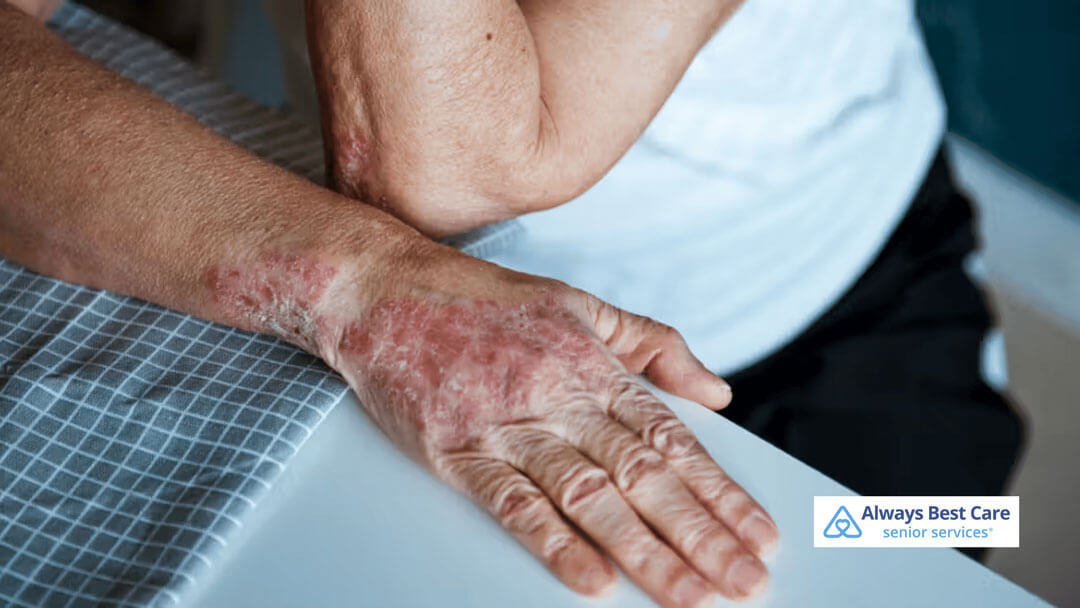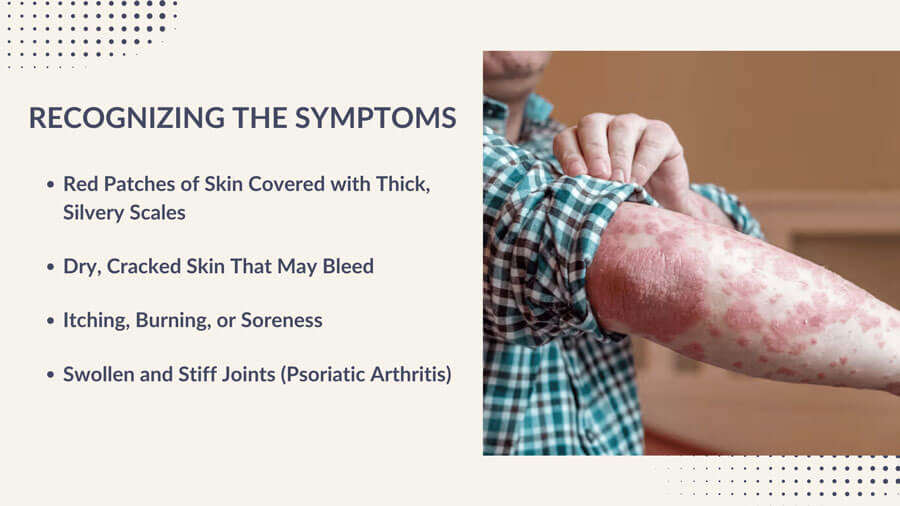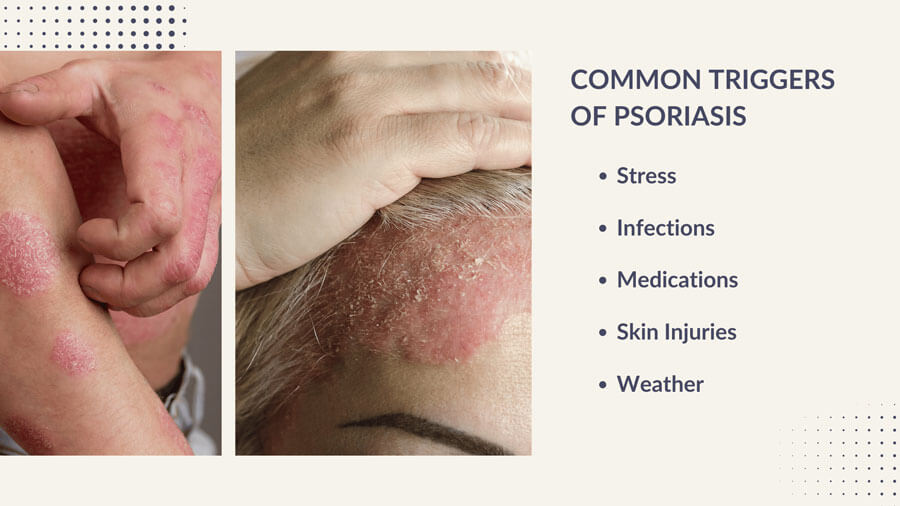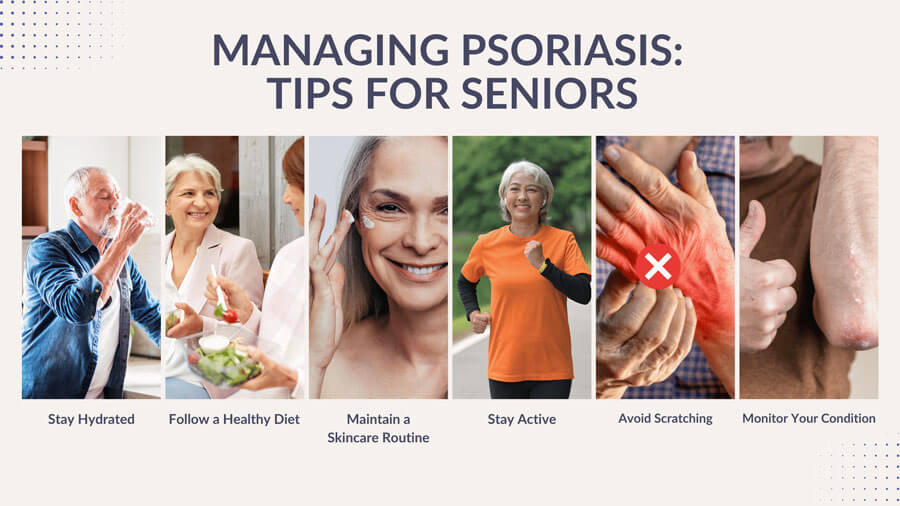Managing Psoriasis Flare-Ups: Tips for Seniors

Living with psoriasis can be challenging, especially for seniors. This chronic autoimmune condition affects 1 million adults in Canada and requires diligent care and management. As we age, our skin becomes more sensitive, our immune systems change, and our lifestyles evolve, making it crucial to adapt our approach to managing psoriasis. This comprehensive guide offers practical tips to help seniors keep psoriasis under control and maintain a high quality of life.
Table of Contents
What is Psoriasis?
Psoriasis is a long-lasting autoimmune disorder where the immune system mistakenly attacks healthy skin cells, causing them to multiply rapidly. This results in the accumulation of cells on the skin’s surface, forming itchy, painful scales and red patches. Understanding the nature of psoriasis is the first step in managing it effectively.
Recognizing the Symptoms

Psoriasis manifests in several ways, and recognizing its symptoms early can help in managing flare-ups more effectively. The primary symptoms of psoriasis include:
Red Patches of Skin Covered with Thick, Silvery Scales
One of the most common symptoms of psoriasis is the appearance of red patches on the skin that are often covered with thick, silvery scales. These patches can occur anywhere on the body but are frequently found on the elbows, knees, scalp, and lower back. The scales result from the rapid turnover of skin cells, which build up on the surface and form thick, flaky layers. These patches can be itchy and uncomfortable, sometimes leading to severe pain if left untreated.
Dry, Cracked Skin That May Bleed
Psoriasis can cause the skin to become extremely dry and cracked, leading to bleeding. This symptom can be particularly distressing for seniors, as aging skin tends to be more delicate and prone to injuries. Keeping the skin well-moisturized is essential to prevent cracking and bleeding. Using thick, emollient-rich creams can help maintain skin hydration and integrity.
Itching, Burning, or Soreness
The affected areas of the skin often experience intense itching, burning, or soreness. This discomfort can significantly impact a senior’s quality of life, making it difficult to sleep, concentrate, or perform daily activities. Scratching the itchy areas can lead to further skin damage and exacerbate psoriasis symptoms, making it crucial to manage itching effectively through proper skin care and medication.
Swollen and Stiff Joints (Psoriatic Arthritis)
In addition to skin symptoms, some individuals with psoriasis develop psoriatic arthritis, a condition characterized by swollen and stiff joints. This can lead to pain and reduced mobility, affecting daily activities and overall quality of life. Early diagnosis and treatment of psoriatic arthritis are essential to manage symptoms and prevent joint damage. Commonly affected areas include the fingers, toes, and lower back. Symptoms can range from mild stiffness to severe joint pain and deformity.
Identifying these symptoms early and understanding their triggers can help in managing flare-ups. Monitoring the onset of symptoms and seeking medical advice promptly can lead to better management and control of the condition.
Common Triggers of Psoriasis

Several factors can trigger or worsen psoriasis symptoms, including:
- Stress: Emotional stress can exacerbate psoriasis. It’s essential to incorporate stress-reducing activities into your daily routine, such as meditation, yoga, or deep-breathing exercises.
- Infections: Illnesses like strep throat can trigger psoriasis. Taking preventive measures, such as frequent hand washing and avoiding close contact with sick individuals, can help.
- Medications: Certain drugs, including lithium and beta-blockers, can aggravate psoriasis. Consult your doctor about alternative medications if you notice a correlation.
- Skin Injuries: Cuts, scrapes, and severe sunburns can cause psoriasis flare-ups. Protect your skin by using sunscreen and taking precautions to avoid injuries.
- Weather: Cold, dry weather can dry out your skin, making psoriasis worse. Use a humidifier indoors during winter and keep your skin moisturized.
Managing Psoriasis: Tips for Seniors

Managing psoriasis as a senior requires a thoughtful and comprehensive approach. Aging skin needs extra care, and lifestyle adjustments can significantly reduce flare-ups. Here are several practical tips to help seniors manage psoriasis effectively and improve their overall skin health.
Stay Hydrated
Hydration is crucial for skin health. Drink plenty of water throughout the day, and use a high-quality moisturizer to hydrate your skin. Look for products designed for sensitive skin that are free of fragrances and dyes.
Follow a Healthy Diet
A balanced diet can significantly impact your skin health. Incorporate anti-inflammatory foods such as fruits, vegetables, lean proteins, and whole grains into your meals. Omega-3 fatty acids, found in salmon, flaxseeds, and walnuts, can help reduce inflammation.
Maintain a Skincare Routine
Establishing a consistent skincare routine is essential for managing psoriasis:
- Use gentle cleansers: Choose hypoallergenic, fragrance-free cleansers that won’t dry out your skin.
- Opt for warm baths: Warm (not hot) baths with Epsom salts or colloidal oatmeal can soothe your skin.
- Moisturize regularly: Apply a thick, emollient-rich cream immediately after bathing to lock in moisture.
Stay Active
Regular exercise helps reduce stress, improve overall health, and boost the immune system. Engage in low-impact activities such as walking, swimming, or yoga. Exercise not only benefits your physical health but also enhances your mental well-being.
Avoid Scratching
Scratching can worsen psoriasis. To manage itching:
- Keep your nails short: This reduces the risk of skin damage from scratching.
- Use cold compresses: Apply them to itchy areas for relief.
- Wear soft fabrics: Choose breathable materials that won’t irritate your skin.
Monitor Your Condition
Keep track of your psoriasis symptoms and triggers in a journal. Note any changes in your routine, diet, or environment that correlate with flare-ups. Share this information with your healthcare provider to adjust your management plan as needed.
Professional Support: How Always Best Care Can Help

At Always Best Care, we recognize the unique challenges seniors face in managing psoriasis. Our compassionate caregivers offer personalized support to help you maintain your health and well-being. From assisting with daily skincare routines to providing emotional support, we’re here to help.In-home care services can be particularly beneficial for seniors managing psoriasis. Our caregivers can help you avoid triggers, follow your skincare regimen, and manage your condition effectively. For more information and to schedule a free consultation, contact Always Best Care of Oakville at (647) 931-7778 to learn more and schedule your free consultation.





